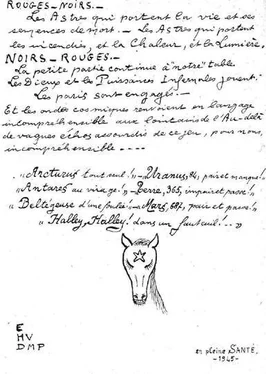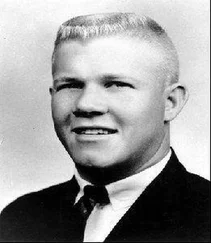Madame Guschinow testified that her husband told her that Petiot would take care of all the details and he was not concerned, except for the injections.
“Nonsense!” Petiot interrupted. “I gave him injections for a year. Why would he be worried?” He accused her of making up the story based on an article she read in Paris-Soir .
Leser warned Petiot to choose his words wisely. The witness was testifying under oath.
“No, that is just what she is not doing,” Petiot said.
Leser, grabbing the edge of the table, lunged forward in anger at the defendant for this latest defiance. Petiot, however, was correct. The witness had not been sworn in; as a party to a civil suit, she was not legally required to take an oath.
Maître Archevêque asked about the handwriting in the postcards and letters, which appeared shaky and more strained than usual. He was leading into his theory that Petiot had kept Guschinow as hostage for three days, forcing him to write letters to his wife.
“It’s normal,” Petiot said, brushing aside the irregularities in the script. “He was a sick man on the point of making a long journey.” Petiot then challenged the witness, her attorney, and the prosecution to produce a single piece of Guschinow’s clothing or jewelry found at his apartment.
“But a suitcase that he purchased was found there,” Dupin said.
“I’m the one who told you that,” Petiot said. The suitcase had been left behind, he added, because it was too heavy for the upcoming journey. “You do not cross three frontiers with a weight like that. I then suggested to Guschinow that he should exchange that suitcase for a smaller bag.”
Madame Guschinow recounted how she went to Paris every month to ask Petiot about her husband. Each time, the physician told her that his business was thriving in Buenos Aires, and suggested that she sell her belongings and join him. Other than the first communication written in code, Petiot would not show her any of the letters, because he claimed that they contained confidential information about his organization and he had destroyed them.
Petiot accused her again of lying and of wanting to remain in Paris because she had a new lover. Floriot agreed, suggesting that she had memorized her testimony and repeated certain phrases verbatim. Several people began speaking at once.
After order was restored, Floriot wanted to know why Guschinow did not join her husband.
“My health, my business,” she began, before Petiot again interrupted.
“She had found a younger lover.”
“But you had confidence in Dr. Petiot?” Floriot asked.
“Yes, I had confidence in him.”
“You said during the investigation that you didn’t leave because you didn’t have faith in the doctor.”
Petiot asked if she knew about her husband’s condition and the injections he received for his treatment. The way he said the words made it clear that Guschinow had caught a venereal disease. Leser did not like the way the questioning was proceeding. There were many witnesses scheduled to appear, he said, and asked Guschinow to stand down. Otherwise, he added, the trial might drag on until July.
After Guschinow’s former associate Jean Gouedo testified about the fortune that his friend had carried and that the furs in Petiot’s possession were certainly not gifts, Floriot went on the attack. He wanted to know if a court-appointed commission had been sent to Buenos Aires to look for Guschinow.
When Dupin dodged the question, Floriot insisted that the prosecution had had ample opportunity to investigate Guschinow’s whereabouts and neglected this simple means of verification. He was relentless. Leser said that the court should “send a telegram.”
“No one is dead or missing,” Floriot started, before members of the audience laughed and he realized how the words sounded.
“No one is dead or missing in the Guschinow case ,” Floriot corrected himself. “Let’s first make these confirmations in Argentina.”
ONE of the more interesting witnesses in the trial took the stand that day. Michel Cadoret de l’Epinguen, a thirty-three-year-old interior designer, was one of the few known people who had attempted to escape through Dr. Eugène but, after gaining admission, backed out. He had left Paris with his wife and son by another underground route in July 1943. When the family returned to the capital after the Liberation, they found that they had been listed among Petiot’s victims. Cadoret de l’Epinguen had a valuable perspective indeed.
The witness explained that he had been referred to Petiot through Robert Malfet, a chauffeur who had been arrested after the Liberation with more than 300,000 francs and a fortune of jewels in his possession, in addition to fur coats, clothes that did not match his size, and a collection of fifty-five newspaper articles about the Petiot case.
Malfet, the witness said, had spoken of the process ahead, including the acquisition of false papers, the stay in a town house belonging to the organization, and the necessity of injections to enter Argentina. These injections, Petiot said, would “render us invisible to the eyes of the world.”
Petiot scoffed. “The mad doctor with his syringe. It was a dark and rainy night. The wind howled under the eaves and rattled the windowpanes of the oak-paneled library.”
Leser admonished him. “Petiot, please.”
Cadoret and his wife, a psychiatrist, had been skeptical of the need for papers and injections, and more than a little concerned about Petiot’s knowledge of drugs like peyote. Petiot himself seemed to be under the influence, as did the woman Cadoret called “his secretary, Eryane.” There was only one Eryane close to Petiot in 1943: Eryane Kahan, the alleged recruiter who herself would soon take the stand.
In December 1944, Cadoret had told the police that he and his wife had met with Kahan. On their way to the hair salon, the three of them passed a number of German soldiers, who, worryingly, saluted Kahan and exchanged a few words in German with her. The Cadorets had also been concerned about Petiot’s vague responses and the inability to get a straight answer from him about the place of departure and the place of arrival in Argentina. What particularly disturbed them, however, was something else: “He had black stains under his fingernails, which we found unusual for a doctor.” Petiot laughed again.
The witness testified that they had also been surprised that a supposed member of the Resistance operating a philanthropic organization would charge a fee of 50,000 francs for passage out of the country.
Wasn’t the charge, Petiot asked, at first 90,000?
Cadoret did not remember.
“It’s very important,” Petiot said. “That’s what saved your life!”
At these words, members of the audience shrieked in horror. Petiot tried to clarify his meaning, claiming that he asked such a high fee to discover if the witness was a real candidate for departure. The Cadorets’ refusal showed that they were not Gestapo informers and so he had reimbursed them for their expenses.
Floriot wanted to underscore this point. Who had backed out first? Cadoret admitted that he contacted Eryane Kahan to decline, but she immediately announced that Petiot would have no further dealings with him and his family.
The defense counsel had scored again, but the question remained why Petiot would, all of a sudden, refuse a client who passed his test for not working for the Gestapo. Wasn’t he claiming to be operating an escape organization, and if not, what did this new admission mean for his assertion that he had helped other clients reach South America? The questions were unfortunately not addressed.
“Will we have the pleasure and honor of seeing Madame Cadoret this afternoon?” Petiot asked, as the witness left the stand.
Читать дальше












